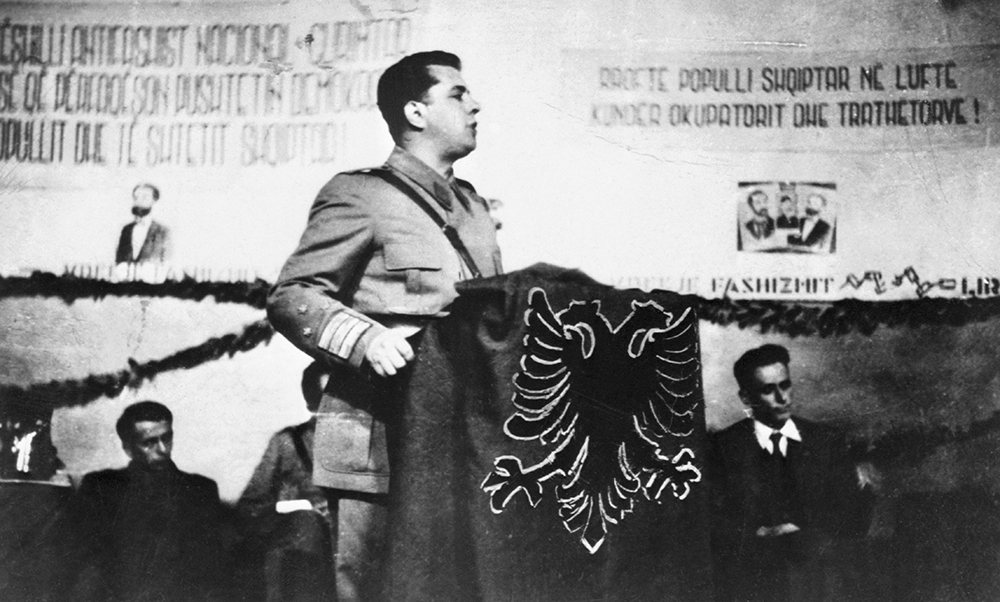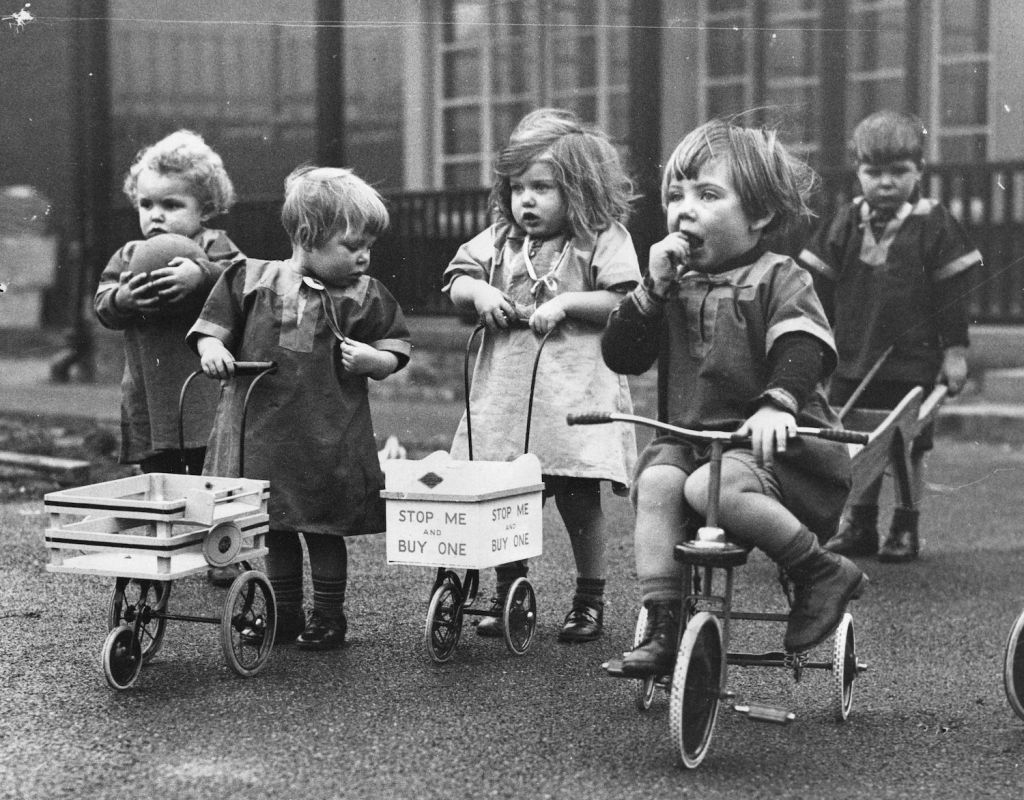
Before the second world war, the Croydon-born cricketer C.B. Fry was offered the throne of Albania. It’s not certain why. Possibly because his splendid party piece involved leaping from a stationary position backwards on to a mantelpiece. Or because, historically, the Balkan nation has been so inexplicably Anglophile as to appreciate the pratfalling funnyman Norman Wisdom.
Sadly Fry declined the role and it was later taken by the fabulously named if catastrophic ruler King Zog (real name Ahmed Muhtar Zogolli). Had Fry accepted, history, that capricious monster mixed of chance and fate, would have been very different. In reality, Zog was toppled in 1939 by Mussolini’s invading fascists, who turned Albania into an Italian protectorate before it fell under the Nazi yoke. In 1946, the country became the fief of the maverick Marxist strongman Enver Hoxha who, despite banning rock and roll, was celebrated in song after his death in 1985 by the British punk poet Attila the Stockbroker and post-punk combo Test Department.
These are no small matters. How lives are elevated or ruined by historical circumstance; and whether it is possible, or even worthwhile, to retain one’s dignity when tossed hither and yon thanks to multiple geopolitical balls-ups in the Balkans are the themes of Lea Ypi’s book.But Indignity is not quite as thrilling a biographical and intellectual journey as Ypi’s 2021’s Free, an award-winning memoir of growing up in communist Albania.
She was born in 1980 and in that first book recalled how, like a Balkan Jojo Rabbit, she was in thrall to an evil dictator before being disabused:
Freedom is not only sacrificed when others tell us what to say, where to go, how to behave. A society that claims to enable people to realise their potential but fails to change the structures that prevent everyone from flourishing is also oppressive.
It was a message I at least took as pertinent not just to Cold War Albania but to many 21st-century polities, Britain included.
Ypi is now professor of political theory at the London School of Economics, and proof that the Albanians in our midst are different from the human traffickers or accomplished handymen of racist stereotype. She’s a nuanced political thinker – though I was disappointed to learn that the ‘Y’ in her name is pronounced as an elongated ‘u’, as in the French tu. I’d been pronouncing it Yippee, which is much more jolly.
Indignity attempts something formally quite difficult to pull off. A mysterious photo of the author’s grandmother, Leman, taken in 1941, shows her lolling in a deckchair on her honeymoon in white furs at the Italian ski resort of Cortina d’Ampezzo with her new husband Asllan. Ypi decides to recreate Leman’s life, filling factual lacunae with imagined biography. The result isn’t always convincing (too many characters speak as though they’re in one of the author’s seminars); but this angry, funny and fond book reminded me variously of Kafka, Bulgakov at his most heartbroken, and Tibor Fischer’s Hungarian novel of communist-era tomfoolery, Under the Frog.
The curious photo appears online, only for Leman to be trashed by trolls who argue that it typifies how the posh Ypi family reclined in their pomp while Europe burned. ‘The grandmother too was a bitch,’ goes one online comment. ‘Perhaps not a bitch, but a communist spy,’ adds another. ‘And, before that, a fascist collaborator.’
Ypi plunges into the archives to prove these anonymous boneheads wrong:
Why should these people decide – without knowing her, without knowing us – what my grandmother wanted, who she was, what that photo meant? And what gave them the right to share it, to summarise her and then heap scorn on it?
Ypi’s mission will resonate for anyone subject to an online pile-on, or indeed anyone with a heart.
This imaginative redemption of a beloved grandmother restores to her the dignity denied her in life
Once in Tirana’s archives, though, she finds Hoxha’s secret service files on her grandmother are full of nonsense and lies. One document claims that Leman died before Lea was born. Who, then, was the lovely granny Ypi knew as a child? About whom, if not her grandmother, did she deliver a funeral eulogy in 2006? So, instead of a historical narrative drawn from dodgy dossiers, we are given this imaginative reconstruction of Leman’s decline and fall, along with the vexed historiographical question: when archives lie, is it not fiction where historical truth most likely resides?
Leman came from a privileged family, we learn. Her grandfather, Ibrahim Pasha, was the Ottoman Sultan Abdul Hamid II’s favourite adviser. After Ibrahim Pasha was banished from Constantinople to Salonica (now Thessaloniki) for some offence, he received the Sultan’s reconciliation gift, a huge iron cage containing 100 canaries. The birds thrived, caged yet singing, becoming, throughout this book, emblematic of defying circumstances.
The aviary also suggests the ampleur of Leman’s early life. She was raised in a spacious villa with nannies, maids and French tutors. But there’s a twist: Leman and her family were, though infinitely cosmopolitan and multilingual, Muslim and ethnically Albanian. And so, thanks to the crazy shuffling of history (the 1923 Treaty of Lausanne redrew Balkan borders with a barmy ethnic ruthlessness that prefigured the partition of India), she ends up trying to make her way as a secretary in interwar Tirana.
There, clever, adorable and increasingly connected with Albania’s intelligentsia, she falls in love with Asllan Ypi, the author’s grandfather, a lawyer suspected of that most diabolical of crimes, consorting with British agents, including the marvellously named Vandeleur Robinson. Asllan also loudly opposed the denial of human rights and political freedoms being touted by his youthful chum, one Enver Hoxha. Indeed, Asllan’s noble speaking of truth to communist power would prove the couple’s downfall.
Leman’s tale is a bitter one. The woman who holidayed in furs in the Dolomites has everything stripped from her once the communists come to power in 1946. Her husband is jailed for 20 years for conspiring against the People’s Republic of Albania and their marital home is repurposed as the HQ of the Women’s Antifascist Front. She is branded a class enemy, exiled to a cooperative farm, given the title of assistant worker for drains and sewage, and winds up digging trenches. Her son, the author’s father, is left with strangers, in what amounts to a prefiguring of Mao’s Cultural Revolution.
What then is dignity? Ypi writes:

There is something about the human spirit, my grandmother would say, that withstands all attempts at injury, offence or humiliation – something animals are incapable of because they are incapable of thoughts disconnected from their immediate existence. We call it dignity.
I’m not so sure. I suspect dignity can be stripped from one, too.
Elsewhere, more plausibly, she imagines a conversation between Asllan and his father, who, as prime minister of Albania, failed to send troops to their doom against Mussolini’s forces – an omission that earned his son’s contempt. Xhafer Ypi snarls at his son:
Dignity, you say? Our navy has just over one hundred men, the gendarmerie a couple of thousand, we possess a grand total of four patrol boats and two tanks… And have you ever considered that in the improbable event of defeating the Italian army, behind Mussolini is Hitler? Does your dignity demand that we send the last few men we have to the slaughter?
Excellent rhetoric, and one that implies that dignity is a luxury, something that in extremis little states like Albania or little people like Leman must rub along without.
Dignity, then, may not be the most important thing in life; but to be stripped of it and to have one’s posthumous reputation so cruelly tarnished by fools and strangers is a horrible fate indeed. This imaginative redemption of a beloved grandmother restores to her the dignity denied her in life and for years afterwards. It is a magical literary feat and one of the most touching books I’ve read this year.







Comments